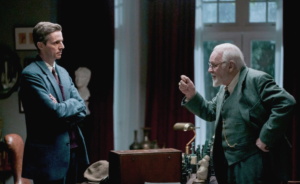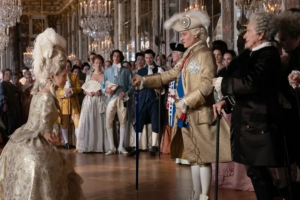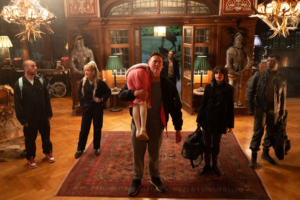THE EIGHT MOUNTAINS reviewed by GREG KING
Directors: Felix von Groeningen and Charlotte Vandermeersch
Stars: Luca Marinelli, Alessandro Borghi, Lupo Barbiero, Cristiano Sassella, Filippo Timi, Andrea Palma, Francesco Palombelli, Elena Lietti, Elisabetta Mazzullo, Surakshya Panta.

This bittersweet, beautifully shot and languidly paced drama exploring the friendship between Bruno and Pietro over the course of four decades gains a theatrical release following its screenings as part of the Italian Film Festival at Palace Cinemas. The Eight Mountains also won the Jury Prize at the Cannes Film Festival and has done well on the festival circuit.
“I didn’t expect to find a friend like Bruno in my life. Nor that friendship was a place where you put down roots,” remarks the adult Pietro in the opening moments of the film, and this comment sets the scene for this epic tale of friendship and self-discovery.
Bruno (Lupo Barbiero) and Pietro (Cristiano Sassella) first meet as young boys during a summer holiday in 1984 in the remote mountain region of Grana in the Aosta Valley when Pietro and his parents come to the small village for a break and to get away from the city of Turin. Bruno is the only boy in the village and he and Pietro quickly connect. The two boys explore the bucolic countryside, the mountains and the wilderness of the region. Pietro’s father Giovanni (Filippo Timi) also takes them hiking and accompanies them on mountain climbing expeditions. But tensions arise between the two families when Pietro’s parents offer to sponsor Bruno’s education in the city, and this drives a wedge between the two boys. Bruno’s father rejects the offer and Bruno is forced to work on his uncle’s farm. But while Pietro’s family often return to the region for a holiday, Pietro remains behind in Turin. Both boys have grown estranged from their fathers.
It is another fifteen years before the two meet again as young men. Following the death of his father Pietro (Luca Marinelli, from The Old Guard, etc) comes to Grana and reconnects with Bruno (Alessandro Borghi, from The First King, etc). Pietro learns that his father still went climbing with Bruno during his frequent visits to the area. The two men now bond as they renovate an old rundown mountain cabin that Pietro’s father left for Bruno. The cabin becomes a symbol of their enduring friendship. While Bruno still works on his uncle’s farm, Pietro has become a chef in Turin. Restless he travels to Nepal where he tries to write a book. But two men continue to return to the mountain cabin over the years where their easy-going friendship picks up.
The Eight Mountains is based on the award winning 2016 novel written by Paolo Cognetti, and it has been beautifully adapted to the screen by Belgian husband-and-wife filmmakers Felix von Groeningen and Charlotte Vandermeersch (who previously collaborated on 2012’s art house hit The Broken Circle Breakdown, etc). Visually the film brings the novel to life on the screen, and its profound themes exploring ideas of masculinity, male friendships, family, the innocence of youth, complex father/son relationships and the journey to find one’s place in life, all resonate strongly.
The sweeping mountains and majestic landscapes have been evocatively shot by cinematographer Ruben Impens (The Broken Circle Breakdown, etc), and the use of the boxy academy ratio gives the material a more claustrophobic and intimate feel than embracing the epic scope that the usual widescreen lensing one would provide. The film was shot on location in the Italian Alps near the border with France, but it was a difficult shoot as the filmmakers had to overcome the harsh weather conditions and the remoteness of the location. The evocative country/folk music score and haunting songs from Daniel Norgren further enrich the material.
Both Marinelli and Borghi deliver flawless performances that bring depth and empathy to their characters, and the shared intimacy of their platonic relationship seems natural and authentic. As the younger version of Pietro and Bruno, both Sassella and Barbiero, in their feature film debuts, are also very good and bring a youthful joy and innocence to their roles.
The languid pacing for the film’s generous 142-minute running time may initially seem daunting for many, but if you immerse yourself in the gorgeous imagery and music you will be swept up in this cinematic experience.
★★★☆



